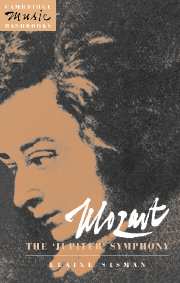Book contents
- Frontmatter
- Contents
- List of tables
- Preface
- 1 The symphony in Mozart's Vienna
- 2 Grand style and sublime in eighteenth-century aesthetics
- 3 The composition and reception of the “Jupiter” symphony
- 4 Design: four movement-plans
- 5 Gesture and expectation: Allegro vivace
- 6 Structure and expression: Andante cantabile
- 7 Phrase rhythm: Menuetto, Allegretto
- 8 The rhetoric of the learned style: Finale, Molto allegro
- Appendix: A. Oulibicheff, “The ‘Jupiter’ Symphony of Mozart” (1843)
- Notes
- Select bibliography
- Index
- Also of interest
Appendix: A. Oulibicheff, “The ‘Jupiter’ Symphony of Mozart” (1843)
Published online by Cambridge University Press: 18 November 2009
- Frontmatter
- Contents
- List of tables
- Preface
- 1 The symphony in Mozart's Vienna
- 2 Grand style and sublime in eighteenth-century aesthetics
- 3 The composition and reception of the “Jupiter” symphony
- 4 Design: four movement-plans
- 5 Gesture and expectation: Allegro vivace
- 6 Structure and expression: Andante cantabile
- 7 Phrase rhythm: Menuetto, Allegretto
- 8 The rhetoric of the learned style: Finale, Molto allegro
- Appendix: A. Oulibicheff, “The ‘Jupiter’ Symphony of Mozart” (1843)
- Notes
- Select bibliography
- Index
- Also of interest
Summary
A. Oulibicheff (Ulïbïchev), “The ‘Jupiter’ Symphony of Mozart,” Dwight's Journal of Music (Boston), vol. 27, no. 16 (26 October 1867), pp. 121–2. (“Translated from the German for this Journal.”) Source: Oulibicheff, Nouvelle Biographie de Mozart (Moscow, 1843), vols. II and III.
We come now to Mozart's last and most perfect creations in the Symphony kind: the works in G minor and in C. They are almost twin sisters, for they were produced only a month apart. Although these sisters are incomparably beautiful, they differ none the less in features and in character. A dilettante of the eighteenth century would have compared the younger to Minerva, accompanied by Apollo and the Muses; and the older to Venus weeping over the death of Adonis; and he would have recognized in the one all the attributes of the heart, in the other all the gifts of the mind.
The man of all kinds, all expressions, all contrasts, has bequeathed to us a last work, in which instead of the elegiac mode (Symph. in G minor) with its most sorrowful outpourings, we find the Dithyramb raised to the highest pitch of splendor, of enthusiasm, of sublime Pindaric intoxication and bewilderment. The Symphony in C shows us what glorious inspirations lifted Mozart's soul from the things of to-day to a better morrow, in the midst of the sorrows which he has just related to us (in the G-minor), sorrows inseparable from a doomed and already wavering life, from which each of his masterworks took away with it a part, and of which already he began to feel the end so near.
- Type
- Chapter
- Information
- Mozart: The 'Jupiter' Symphony , pp. 80 - 85Publisher: Cambridge University PressPrint publication year: 1993
- 1
- Cited by



